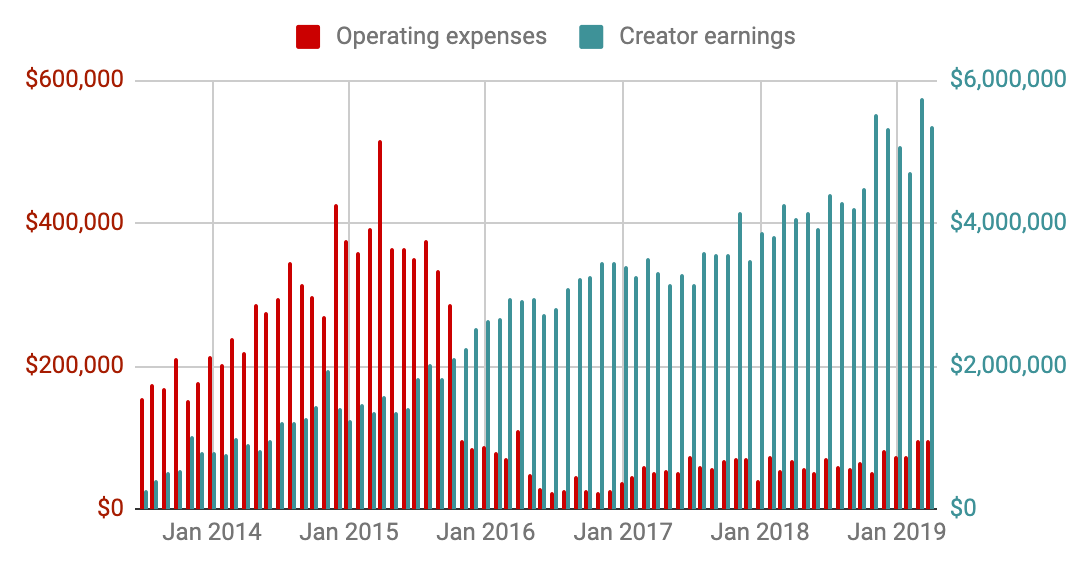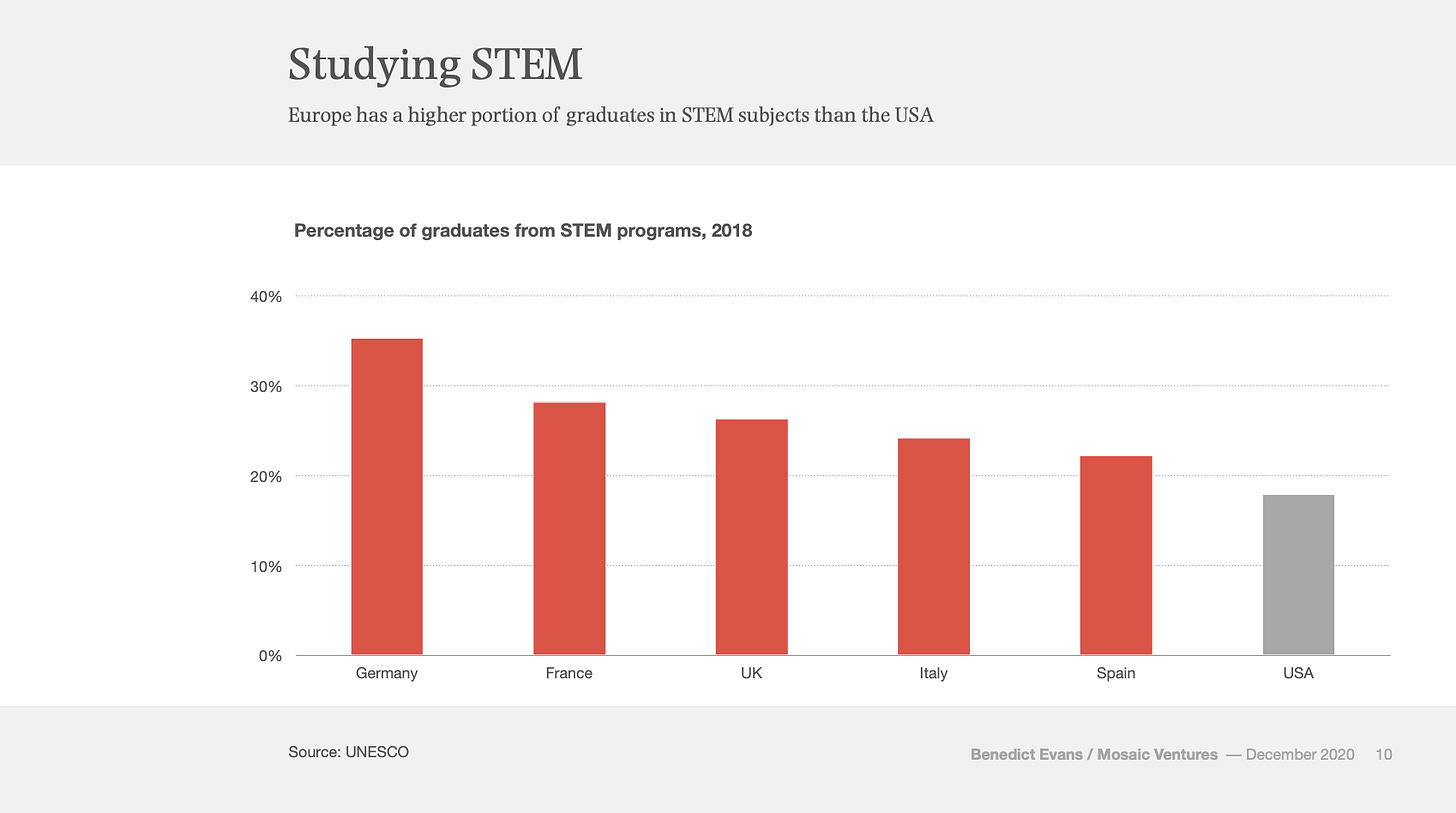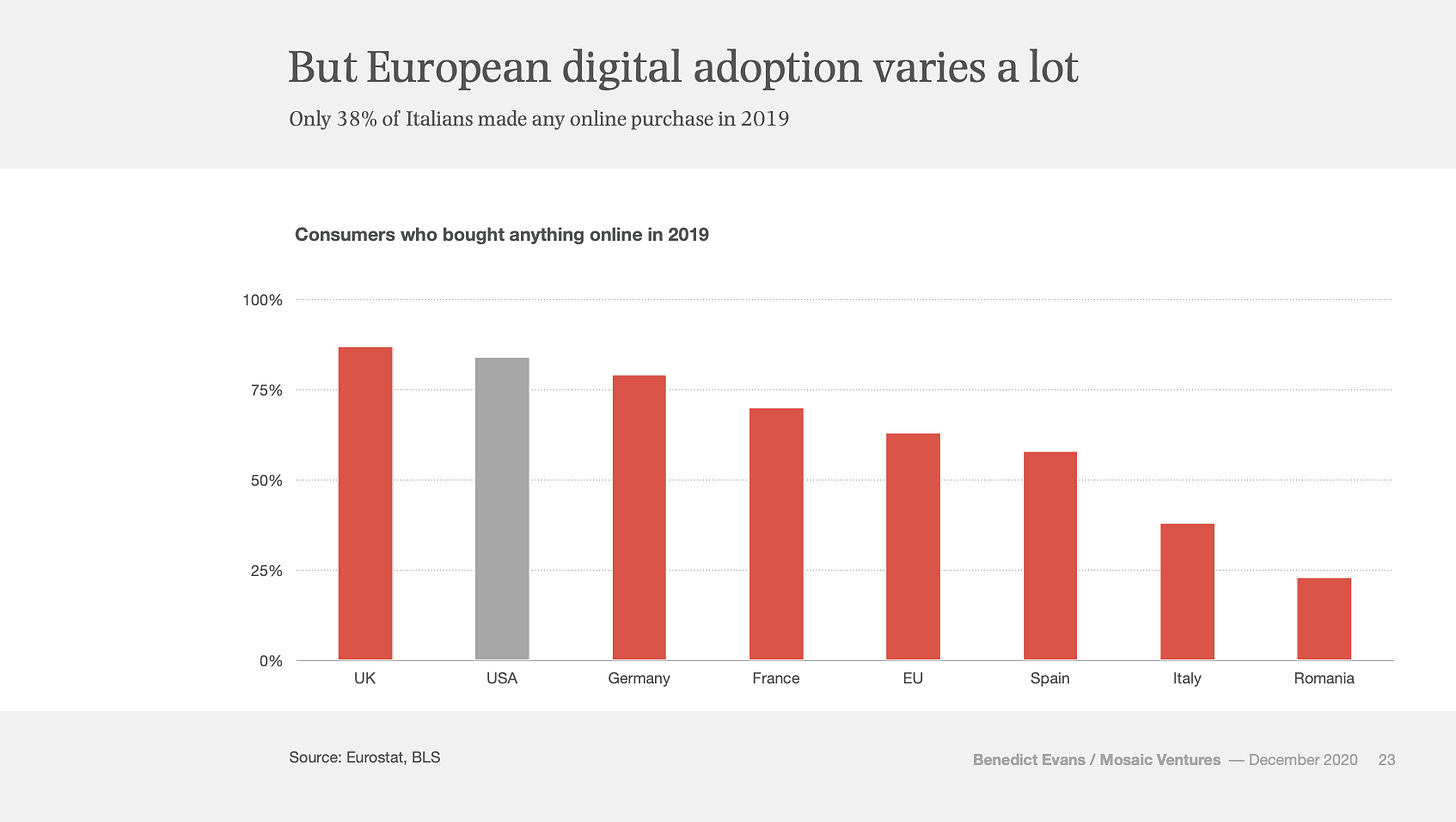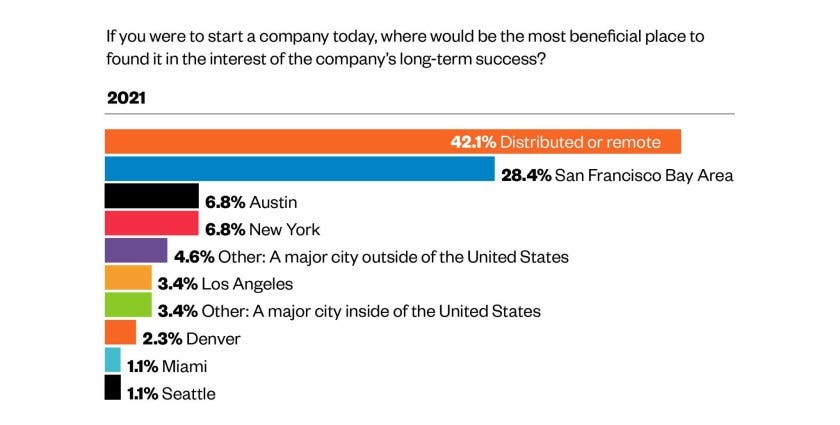Hi, it’s Alexandre from Idinvest. Overlooked is a weekly newsletter about underrated trends in the European tech industry. Today, I’m sharing the most insightful tech news of January
For 2021, I wanted to pick one piece of news per day and write a short comment about it. I want to talk about something that strikes me. Something that happened in the tech ecosystem. Here is the issue for January!
Please note that the date picked for each event is not always the exact date of the event but the date I decided to write about the event.
Friday, Jan. 1st: Amazon acquired podcast network Wondery for c.$300m. Wondery was founded in 2016, raised $15m in funding from Advancit Capital, BDMI and Greycroft, reached 9m listeners in Nov. 2020, was on track to generate $40m in revenues in 2020 and is known for producing podcasts like Dirty John, Dr Death and Business Wars. Numerous media and music streaming companies have acquired podcast production houses in the past 24 months starting with Spotify (Gimlet, The Riger, Anchor). - Techcrunch, The Wall Street Journal
Saturday, Jan. 2nd: I listened to an Invest Like the Best's podcast episode with Figma's cofounder and CEO Dylan Field. Figma is a collaborative online design tool. In 2020, the company raised $50m at a $2bn valuation from a16z. The interview is full of insights into the design market. - Invest Like the Best
"Design has become more and more critical to the way people create software." For instance, at IBM the designers to engineers ratio went from 1:72 in 2012 to 1:8 in 2017. Numerous companies are now targeting a 1:6 or 1:8 ratio. Design has become a key differentiator. If your product is best in class in design, you can beat any competitors in your market.
Figma is in the browser (i) to facilitate collaboration in the design process (marketing, engineering, product management, executives, etc. can engage with design) but also (ii) to give the possibility to people to access design for the first time.
In the future, anyone will have minimum skills in design even if they are not professional designers like anyone has writing skills even if we are not all professional writers. A good design tool should be like Word and Excel: easy to start with but with endless possibilities for specialized workers. Another “low floor, high ceiling tool” like Roam.
Dylan redefines the notion of product-market fit by introducing the notion of "product-market pull". "It's almost like when you stumble upon something that should exist, people start to find it and they give you feedback, and they start to pull the product out of you." He takes two examples: (i) a user who sent him a 10-page document full of feedbacks after a user session, (ii) users asking him to build a paying plan to prove to their companies that the solution was legit.
Chapters in the Figma's history: the garage chapter, the closed beta chapter (product unpolished in the market with users excited about it), the market feedback chapter (product is growing like crazy and people are using Figma for use cases we would not have imagined - creating slide decks, brainstorming, making animations etc.) and the design third place chapter (unique design community and knowledge, a product ready to address all the most common use cases we see today on Figma, anyone becomes a designer).
Figma was built to be integrated into the workflows of its users. "I think that if you look at the workflows that people have already, and the way they engage with others on their teams, and you deeply understand those and build around those, but in a way that's still simple and not overly structured, that can create a lot of magic."
Sunday, Jan. 3rd: I read a post on Gumroad’s culture from its founder Sahil Lavingia. He had to reboot the company in 2016 after failing to raise additional capital from venture investors. He fired all of his employees but kept the product alive. As the product kept growing, he started to hire again people but only in part time and implemented a no-meeting and no-deadline culture. - Sahil Lavingia
Monday, Jan. 4th: Ben Evans worked on a presentation on European tech for Mosaic Ventures with numerous learnings. - Ben Evans
Most European countries have a higher percentage of graduates in STEM projects compared to the U.S. and Europe has top CS departments in universities (Oxford, ETH Zurich, Cambridge, Imperial, TU Munich, UCL, EPFL).
Europe remains a fragmented market with language barriers, lower mobility rates than in the US (0.2% Europeans moved country in 2017 vs. 2% of Americans moved state) and a higher distribution of capital and talents across several cities.
Moreover, digital adoption is disparate across European countries. The UK and Nordics countries are ahead of the U.S. in terms of digital penetration while Southern European countries are lagging behind.
120 unicorns have been created in Europe in the past decade. In France, we still have work to do to convert our unicorns into decacorns compared to other European countries.
Tuesday, Jan. 5th: Consumers spent $110.9bn on mobile apps ($38.6bn on Google Play and $72.3bn on the Apple Store) implying a 30% annual growth rate. $79.5bn were spent on games (71.7% of total). Games represented 65.8% of total spent on the Apple Store and 82.6% on the Google Play. Streaming, dating and social media apps are leading the billboard in terms of revenue generated for non gaming apps. - Sensortower
Wednesday, Jan. 6th: Stir did another great drop. They released a product in December to support Youtuber Airrack to get to 1m subscribers. Airrack started his career in 2020 on Youtube with the ambition to reach 1m subs in less than a year. In December, he decided to go and stay on an island until he would reach the 1m threshold. Stir released a website that generated unique affiliate links for fans to win prizes based on how many subscribers they referred to the channel. In 2 weeks, Airrack managed to gather the 250k missing subs to get to 1m subs. - The Hustle
Thursday, Jan. 7th: Pennylane raised a €15m series A co-led by GFC and Partech. Pennylane is both a SaaS which helps SMBs to deal with their financial data as well as an accounting firm. One year after launch, the company has generated €2m in revenues, attracted 550 customers and has 30 accountants working for the company. The SaaS is connected to third party services like Stripe, Payfit or Qonto. As a result, your financial data is always up to date and it makes the accountant's job easier. - Techcrunch
Friday, Jan. 8th: Roblox had delayed its IPO in December because of the incapacity of the financial industry to correctly price the recent tech IPOs. The company announced its new plan: (i) raising a $520m round led by Altimer Capital and Dragooneer, (ii) going public through a direct listing. 2020 was an outstanding year for Roblox. Together with Zoom and Shopify, it's one of the largest tech company that experienced impressive growth last year. As a result, its valuation went from $4bn in February 2020 when a16z led a $150m series G to $29.5bn in this new funding round. If you want to know more about Roblox, I wrote a deep-dive on the company. - Business Wire, CNBC
Saturday, Jan. 9th: Protocol did an interview with Dave's founder Jason Wilk. Dave is another "lateral neo-bank". It started as a tool to help people to avoid overdraft fees with fair short term loans and has now fully moved into the neobank market. Dave has now 8m users including 1m users who use Dave as a bank. - Protocol
With its first product, Dave discovered that many users were in the gig economy (ridesharing, grocery delivery) and started to build features to increase the depth of their relationship with them - like launching Side Hustle which is a job marketplace for part-time work. Dave only launched a neobank when the demand from their existing customers was proven with a waiting list.
Dave's initial product is a brillant distribution hack. It costs $10 to acquire a customer on this first product and it has a 4-5 months payback period. Once you have the initial relationship with customers, you can upsell them other financial products without reinvesting heavily in marketing. (It costs $200 for a bank to acquire a customer buying a credit card).
Sunday, Jan. 10th: Livestreaming is coming to Eastern Europe. Rest of World wrote an amazing article on the topic. - Rest of World
It shares the story of Anastasiia Kanshina. The Russian-born currently living in China became a livestreamer in 2018. She regularly broadcasts to sell products to a Russian speaking audience and has reached a peak of 20k viewers while selling Xiaomi's products. She is using Taobao which is Alibaba's livestreaming app.
Russia is a large foreign market for Alibaba as AliExpress has 20m active buyers who have generated $3.5bn in sales. Livestreaming is still in its experimentation phase in Russia with several issues to be tackled like the difficultly to return products to China. As a result, at the moment, streamers are selling mainly low-value products.
Monday, Jan 11th: Checkout raised a $450m series C led by Tiger Global at a $15bn valuation. Klarna ($10.7bn valuation mark in Sep. 2020) is no longer the most valuable venture-backed startup in Europe. As a reminder, Checkout raised a series B led by Coautue back in June 2020 at a $5.5bn valuation. The company has been successful at targeting enterprise customers with a payment solution that is not a one-size fits all but that is modular to their specific needs. Checkout is used by merchants like Farfetch, Mango, Victoria’s Secret, L'Occitane or The Hut Group. - Checkout
Tuesday, Jan. 12th: Glossier raised a $100m series D led by Sequoia at a $1.2bn valuation. It's a beauty brand founded by creator Emily Weiss in 2014. Emily had a popular blog called Into the Gloss on which she interviewed inspiring women and managed to turn it into a platform to launch a beauty brand. Glossier has a strong community: it does not rely on paying acquisition to generate revenues and it creates a feedback loop to create new products or iterate on existing products. It has a strong competitive advantage compared to both incumbents and other D2C beauty brand. The company now generates more than $200m in revenues and has 200+ employees. Glossier is planning to build a multi-brand beauty empire with a presence both online and offline (it has 2 physical stores at the moment). - Techcrunch
Wednesday, Jan. 13th: French venture backed startup Believe plans to raise between €500m and €750m through an IPO on the Paris stock exchange. Believe was founded in 2005. It's a digital music distribution platform backed by French venture funds Xange and Ventech. I can't wait to write my first IPO coverage of a French venture-backed tech startup listed on our national stock exchange. - Maddyness
Tuesday, Jan 14th: Iziwork raised a $43m series B with Cathay and Bpifrance. It's a digital platform for temporary workers founded in 2018: job seekers upload their CVs and indicate their availabilities while the system analyse their skills and matches them with jobs. Iziwork started with the French market and is now expanding into other European countries starting with Italy. The company has also started to offer financial services to its workers like instant deposits and annual savings account. - Sifted
Friday, Jan. 15th: Idinvest’s portfolio company Swile will replace Edenred as meal voucher provider for the 62k employees at Carrefour. It’s a huge win for Swile and we are lucky to have big corporatations like Carrefour in France which are willing to trust a startup to provide a service that is so key in the life of all French employees. - Les Echos
Saturday, Jan. 16th: Stockholm-based venture capital firms Northzone and Creandum shared the milestones achieved by the their portfolio companies in 2020. Honestly, I'm super impressed. They have both been extremely successful in the Nordics and really managed to become pan-European firms in the past few years. We still have a long way to go in France for local fund managers to be as successful as Creandum and Northzone. - Paul Murphy, Peter Specht




Sunday, Jan. 17th: Webflow raised a $140m series B with Accel, Silversmith and Capital G at a $2.1bn valuation. It’s a powerful no-code platform to build websites. For instance, my side project AppFuel is powered by Webflow. In 2020, Webflow doubled its revenues with 100k paying users, attracted 2m users and ended up the year breakeven. - Techcrunch, Crunchbase, Webflow
Monday, Jan. 18th: One of the most fascinating aspect of my job as a venture investor is to identify the patterns that make successful entrepreneurs. Age is obviously an interesting topic to cover. Guess what? It's better to back boomers! HBR did an extensive study on the correlation between entrepreneurial success and the age of founders. They discovered that the fastest growing startups were started by founders when they were 45 year old on average. It's not what we are used to hear in a tech industry that keeps talking about young geniuses. Another interesting fact is that even entrepreneurs perceived as young genius seem to reach their peak at middle-age. For instance, Steve Jobs introduced the iPhone when he was 52.
Tuesday, Jan. 19th: Deliveroo raised a $180m round from existing investors Durable Capital and Fidelity valuing the company at over $7bn - ahead of a potential IPO in 2021. 2020 was a wild year for Deliveroo. On the one hand, it has been under pressure to become profitable and the company had to lay off 300+ employees. On the other hand, the food delivery business surged with covid: the number of riders doubled to reach 50k and 20k new restaurants joined the platform. It's interesting to look at what the company has in its roadmap for this year: more dark kitchens, more on demand grocery, more Plus subscription and additional services for both restaurants and riders. - Deliveroo
Wednesday, Jan. 20th: Both Glovo and Getir raised a new funding round in the food delivery space. On the one hand, Glovo signed a partnership with a Swiss real estate platform called Stoneweg that will invest €100m to acquire properties to be converted into dark stores for their fast delivery grocery offering. On the other hand, Turkish-based grocery fast delivery startup Getir raised $128m at a $850m valuation with Crankstart Investments, Base Partners and Tiger Global. The company is planning to expand in new cities including London, Sao Paolo and Mexico. - Sifted, Reuters
Thursday, Jan. 21st: Starting a company in the Bay Area is no longer a no-brainer in 2021. A survey of 90 companies (not a significant sample honestly) shows that 42.1% respondents think that it's better to start as a distributed organization to be successful over the long run (vs. 6% in 2020) and only 28.4% picked the Bay Area (vs. 41.6% in 2020). - Initialized
Friday, Jan. 22nd: Abstract published a State of Design report surveying 1k+ designers on their working habits and challenges. - State of Design
Design teams are growing and are getting more complex. 75% of respondents said they planned to add 1-5 designers to their team.
Designers are increasingly pressured to measure their work and 2/3 of the respondents say that tools are missing analytics and reporting capabilities.
Design has become core business. It's not a nice to have that you add to a product just before release but it's something that is core to the product development from day 1.
Saturday, Jan. 23rd: D2C expert Nik Sharma crafted a presentation on everything you need to know on how to launch a D2C brand. - Nik Sharma
He breaks down media channels into three categories:
Earned media: influencers, press, interviews, TV, UGC.
Owned media: brand blog, email and social media.
Paid media: influencers, outdoor, social, search, native and display.
He also recommends that D2C brands build their own publishing arm as a key competitive advantage over the long run.
He shares his favorite tools to manage a D2C brand.
Sunday, Jan. 24th: I listened to an Invest Like the Best with Ilkka Paananen. He is Supercell's founder and CEO. Supercell is a mobile gaming studio born out of Finland and know for blockbusters like Clash of Clans, Clash Royale or Brawl Stars. The company managed to build a unique culture that has made it successful over the long run despite being in a hit-driven industry. Ilkka shared great insights about this culture. - Invest Like the Best
"I am the least powerful CEO in the world". Supercell built a decentralized organisation composed of small and independent teams called Cells.
When recruiting new employees, Supercell looks for three main characteristics: (i) the passion for excellence ("how high is the bar for a given individual?"), (ii) proactive doers (entrepreneurial spirit), (iii) be great to work with. In the end, you should hire individuals who will raise the average quality of the people in the company.
The recruitment process is a key asset that any company should develop. You should accumulate all the learnings through the year and stick to the different steps in the process for any recruitment.
Independent teams are responsible for the games they produce. They can move forward with one game even if all other teams don't believe in the game they’re developing. This super high degree of trust given to individual teams is the cornerstone of Supercell's culture. And it pays off. Boom Beach, Clash Royale, and Brawl Stars were all games that were non consensual.
Supercell's games have a super high lifetime value because they are social first. You play a Supercell's game mostly because you want to play with your friends rather than for the game per se.
Monday, Jan. 25th: Our portfolio company, Alma raised a new round. The company was created by Louis Chatriot (ex. Stripe) in Jan. 2018, raised a €3.3m seed round with Isai and Idinvest in Feb. 2019, a €12.5m series A with Idinvest in March 2020 and a €49m series B with Cathay and BPI. In 2020, the company multiplied by 6 its number of merchants and its volumes processed and onboarded large merchants like Kusmi Tea, Kookai or KitchenAid. Alma will use the funds to triple the size of the team, to reach €1bn in sales within 2y and expand outside France. - Techcrunch, Usine Digitale 🇫🇷
Tuesday, Jan. 26th: USV is on fire! After announcing a $162m fund dedicated to the environment, New-York-based venture house USV raised a $250m seventh core fund. It's still a thesis driven fund. It invests into "trusted brands that broaden access to knowledge, capital, and well-being by leveraging networks, platforms, and protocols". 30% of the fund will be dedicated to crypto investments either in equity or tokens. USV will explore new themes like mental health, knowledge sharing in a remote world, multiplayer fintech, etc. - USV
Wednesday, Jan. 27th: Two interesting moves happened in the newsletter's market. On the one hand, Everything's newsletter moved away of Substack and was rebranded as Every. On the other hand, Twitter is entering the newsletter market by acquiring Revue. - Axios on Every, Every on Every, Twitter on Revue, Tech.eu on Revue)
Everything was a bundle of Substack's newsletters from a collective of famous writers like Nathan Baschez, Li Jin, Dan Shipper, Tiago Forte etc. The collective raised a $600k seed round with Bedrock and decided to build its own media website. It's interesting to note that Substack has not been able to retain some of its top creators. I would guess that it's because of the lack of flexibility and customization as well as the 15% take rate on paying newsletter compared to the value provided.
Twitter is acquiring a Dutch startup called Revue which is a tool to create and distribute newsletters. With the rise of Substack, I suspect that Revue has lost momentum and than Twitter has been able to acquire the company at a reasonable price (even if it's a 6-people team that havse raised only €400k since its inception in 2015). Revue has a 5% commission on paying newsletter which is fairer than the 15% for a Substack's newsletter. Revue will retain its independence and brand but I'm looking forward to seeing the deeper integration between both products. From my own experience, Twitter and a newsletter software are complementary tools for any writer.
Thursday, Jan. 28th: Mental wellness mobile application Opal raised a $4.3m seed round with Speedinvest, Adjacent, ISAI and tier-one business angels. It’s an app to regulate your consumption of other apps especially time-consuming ones like media, social networks and gaming. The funding will be used to grow the team, develop Chrome and Android versions of the product but also to add social features like group sessions and sharing. You can find all the screens of the product on AppFuel here. - Techcrunch


Friday, Jan. 29th: eFounders launched another startup studio dedicated to fintech called Logic Founders led by fintech entrepreneur Camille Tyan. Camille sold a finance startup called Payplug to BPCE and eFounders has already built four fintech companies in their previous batches (Spendesk, Multis, Upflow, Swan). Fintech is a super technical industry with multiple layers and national regulations. Having a dedicated team with a strong expertise makes a lot of sense. The studio will be working on thematics like API-first products, payments orchestration, crypto, B2B identity or asset security. - Techcrunch,
Saturday, Jan. 30th: I read a report on the Romanian's tech ecosystem that has removed UiPath from its data. It's always interesting to look at the rise of new tech scenes. I'm convinced that you can build great tech companies from everywhere in the world and having a strong foothold as a pan European venture fund in countries underserved by capital like Romania makes a lot of sense. In 2020, Romanian startups raised €30m across 59 rounds. As a comparison, in France, 28 startups raised more than €30m in 2020 and UiPath which is the local outlier has raised $1.1bn in funding and is now valued over $10bn. - Database, Howtoweb
Sunday, Jan. 31st: Calendly raised a $350m round from Iconiq and OpenView at a $3bn valuation. Calendly is one of my favorite productivity tools. I use it to streamline my meeting scheduling. Before this round, the company which started in Atlanta in 2013, was almost bootstapped having raised only $550k. It has 10m users (vs. 5m 1y ago) and reached $70m in ARR in 2020. It’s a consumerized product with a strong virality loop as Calendly's users share links that the receivers will open in the Calendly app to pick their time slot. The company was founded by Tope Awotona who was born in Nigeria and had the extravagant idea to cut its tech costs by launching the first version of the product with an Ukrainian team in the middle of the revolution in 2014. The vision with this new funding round is to expand horizontally on the meeting value chain and to integrate more pre and post meetings blocks. - Fortune, Techcrunch, How I Built This
Thanks to Julia for the feedback! 🦒 Thanks for reading! See you next week for another issue! 👋

















